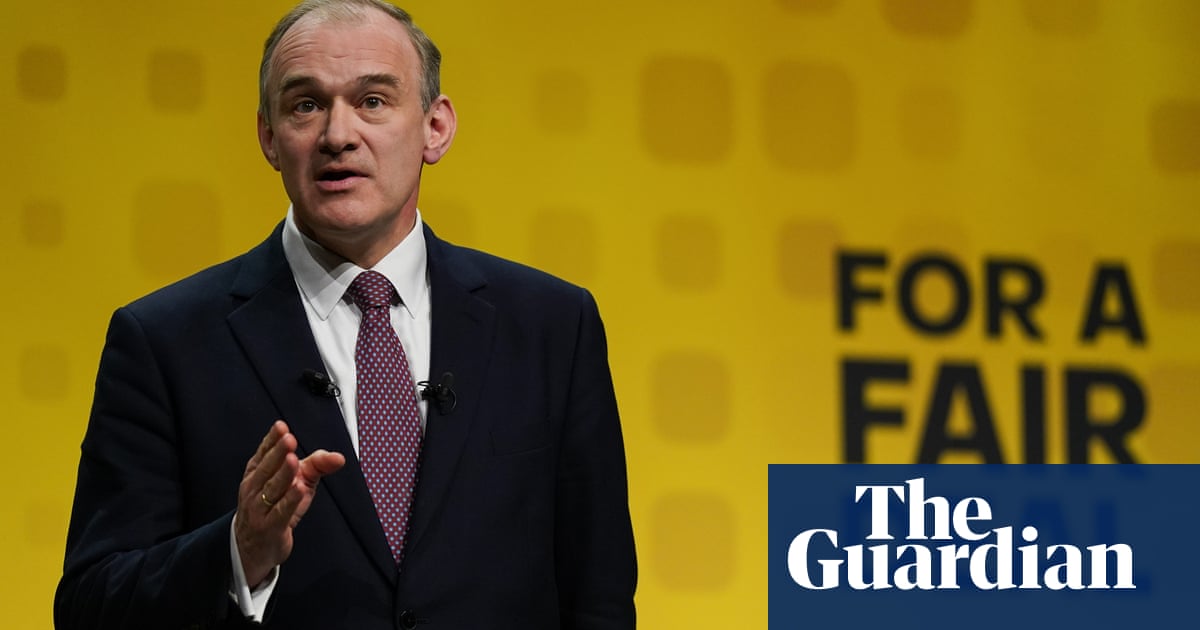
The Liberal Democrats could make a decisive shift to the centre left, shedding the final legacies from the party’s period in coalition, under a review of policy ideas overseen by the leadership hopeful Layla Moran.
A new booklet, Build Back Better, edited by the MP, is billed as a modern equivalent to the Orange Book, a 2004 collection of essays from Lib Dem figures – including the former leaders Nick Clegg and Vince Cable, and former cabinet minister David Laws – which pushed the party towards a centre-right, markets-based stance.
In contrast, Build Back Better, with contributions from more than 40 Lib Dem MPs, members and supporters, includes essays advocating ideas such as a universal basic income, free broadband, and commandeering private health resources to clear a backlog of NHS operations caused by coronavirus.
Many of the contributors to the Orange Book went on to serve in the 2010-15 coalition with the Conservatives, a period followed by three generally disastrous elections for the Lib Dems.
Moran, the Oxford West MP and education spokeswoman, is seen as the joint favourite to win the party leadership battle, alongside Ed Davey, the interim leader.
Davey contributed to the Orange Book and took part in the coalition, and while he has unveiled radical plans of his own, such as a £150bn investment in the green economy, Moran is keen to place herself as the choice of the party’s centre-left.
The third confirmed contender is the Bath MP Wera Hobhouse, who is seen as an outsider.
Work on the book – which does not form part of Moran’s leadership bid – began two months ago, when the leadership race was postponed because of the coronavirus crisis. The competition has since resumed, with a new leader due to be announced in August. Many of the contributors, who include Cable, are remaining neutral on who they support.
Moran said the book was devised to define the party’s “liberal response to coronavirus, so I didn’t really think in terms of positioning”. However, she added, a common theme emerged: “What it shows is we are a party of the centre left – that is where our beating heart lies.”
This amounted to a move away from the ideas of the coalition, Moran said, lamenting what she called an overly slow evolution of ideas in the following period.
“I think we need to send a signal to both other parties and to the electorate that we are moving on from not just coalition but the last five years,” she said. “It’s very clear that at the next election the positioning is going to have to be to take seats off the Tories. That’s the obvious thing.”
She said the Orange Book was seen as a concerted shift to the centre-right. “When people read this, they’ll see it’s a shift to the centre-left. It didn’t set out that way, but it seems to have been the natural response of party members who are writing.”
Several essays are about a green recovery from the impact of coronavirus, with Cable arguing for a new and more ambitious green investment bank. Others tackle the rise of technology and the idea of a digital bill of rights.
One essay, by a former councillor, Paul Noblet, calls for not just a universal basic income, but universal free services, such as broadband, water and energy.
Moran stressed that while the ideas were some way from becoming party policy, she hoped the review would bring a boost to the process of rethinking what the party stands for.
“To put it bluntly, since coalition there has been a bit of a dearth of that in the party,” she said. “Of our membership, 50% are new since the coalition. I don’t think we’ve really harnessed the power of their ideas yet.”












